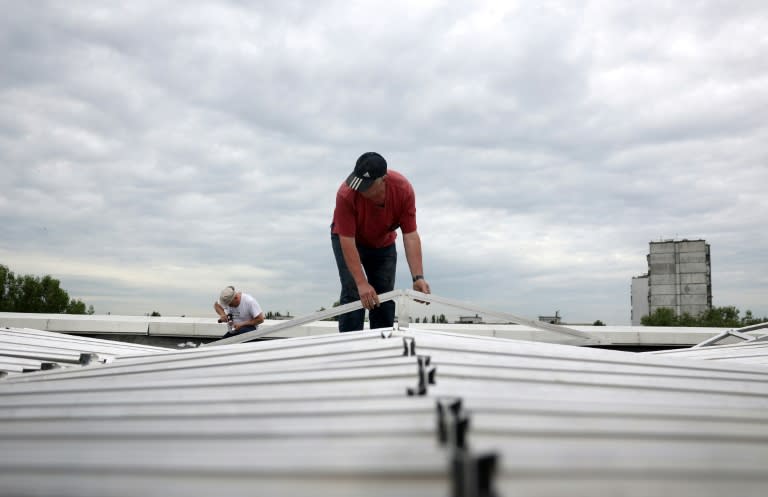Ukraine rushes for solar panels as Russia hits its power grid

Nazariy Gichka surveyed the roof of the Kyiv maternity hospital he runs as workers installed a scarce and suddenly vital new commodity in Ukraine: solar panels.
Waves of devastating drone and missile attacks by Russian forces have again crippled Ukrainian power plants, causing blackouts and forcing Ukrainians to plan for the worst.
"They are being so cynical -- we need to be prepared for anything. Why should children suffer as they are coming into this world?" the hospital director told AFP.
President Volodymyr Zelensky said this week that all hospitals and schools in Ukraine must be equipped with solar panels "as soon as possible".
"We are doing everything to ensure that Russian attempts to blackmail us on heat and electricity fail," he said.
Gichka was already a step ahead. His hospital began work to put the panels in place in late 2022, when Russian strikes were knocking out power and heating for millions.
- Demand rocketing -
As a designated critical facility, the hospital is spared the planned rolling outages designed to ease pressure on the grid.
Generators, and soon the solar panels, ensure the lights and incubators stay on during emergency cuts.
"Patients don't know. We don't even discuss it with them. Our task is simply to make sure that they have everything," Gichka said.
Several floors below, Alina and Pavlo Kondratyuk were holding their son Maksym, born an hour before during air raid sirens that Alina barely noticed.
"I had my own alarm going off here," she said, holding her newborn.
Pavlo said they had been "nervous" about electricity supplies but staff assured them the power would stay on.
"So we didn't worry about it," the 34-year-old told AFP.
Russia says it does not target civilian infrastructure but its defence ministry has acknowledged retaliatory attacks on energy sites that it says support the Ukrainian army.
The war sent demand for renewable energy sources skyrocketing, said Dmytro Bondarenko, a senior researcher from the Institute of Renewable Energy in Kyiv.
It is a major shift for Ukraine, which drew just 11 percent of its energy from renewables before the war -- one of the smallest shares in Europe -- according to the International Energy Agency.
"At the local level, people are already using it. Maybe this pressure from the ground will impact our entire energy system," Bondarenko said.
Alongside the solar panel order, Zelensky this week urged the government to roll out tax incentives and loans for Ukrainians seeking to use energy-saving technology.
- 'Change our way of life' -
But Ukrainians were rushing to source panels before Zelensky's appeal, according to Yuri Skoblikov of installers Solar Tech.
"From the second when power outages started," he said, "we have just had phones going crazy and our office was full of customers."
He said the company has a backlog of orders until August and that employees were getting calls to their personal phone numbers.
Anastasiya Kyslinska, the 51-year-old director of the Spilno School in Kyiv, said they avoided the rush by installing panels in November 2022.
She said they had been vital during "the most difficult times" that winter.
They allowed the school to charge power banks, laptops, keep the lights on, and even share electricity, she said.
"Parents of the children and people from the neighbouring houses came to charge their flashlights and power banks because we had solar panels," she recalled.
Bondarenko, the renewable energy researcher, said that while solar is useful in a bind, it was less stable than traditional sources.
Ukrainian authorities would need to overhaul the energy system to dramatically increase its share in the country's energy mix, he added.
"We can change our way of life, our technology and our activities to fit. There are difficulties, but they are solvable," Bondarenko said.
bur-brw/jbr/fg

 Yahoo News
Yahoo News 
